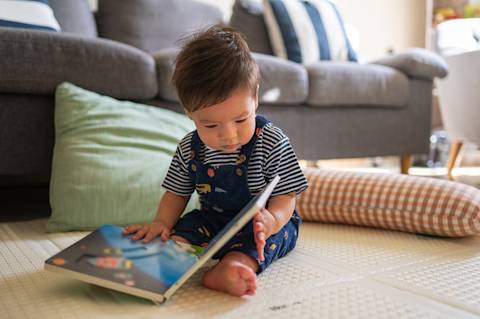Routines, routines, routines. There’s a lot of buzz out there about the importance of developing consistent routines for our children. But many caregivers have unanswered questions about just how important routines are, how to fit them into their already busy lives, and more. Keep reading to find the answers to caregivers’ most-asked questions about developing routines.

A routine is a set of activities that happen at specific times throughout the day or around specific events. Routines can provide structure and predictability for babies and children, which can help them feel more secure and comfortable.
You can create daily routines for when your child wakes up, gets dressed, eats a meal, or goes to bed. Some routines can be weekly, like when you go grocery shopping, do an activity like a weekly walk, or do household chores. Every family can develop the specific routines that work best for their child and their schedule. For example, maybe each morning around 7 a.m., your family eats breakfast together for 10 minutes in the kitchen. No matter what routines you choose, explain to your child every day what's going to happen.
In a word: Yes! Routines provide a sense of security and predictability for babies and children, which can help them feel more comfortable and secure in their environment. This can help avoid tantrums related to feeling out of control of their day. Routines can help children become more independent because they already know what’s expected of them in specific situations. Establishing a consistent bedtime routine can also help babies and children sleep better, which can have a positive impact on their overall health and well-being as well as the health and well-being of their caregivers.
Experts recommend that families start with one routine and try to do it consistently. Once you have that down, add one more. You can keep adding routines to your schedule, depending on what works best for you and your family.
If you skip a routine a couple of times, the first thing you can do is give yourself some grace. Raising children is challenging, and being flexible is often needed. If you have a toddler or preschooler, you can explain to them that you’re going to miss their normal routine today so they can understand the change and feel more secure. Then, as soon as you can, get back into your normal routine.
If you find that you have skipped the routine multiple times in a row, it might be a good opportunity to reevaluate if that routine is working for you and your family—and if you find it’s not working, it’s okay to try something different. It's important to adapt to changes as needed while still maintaining a sense of structure and predictability for your child.
Yes, children can still benefit from a routine if they are in shared custody with someone else. You can develop routines that are specific to when they’re at your home. Some families develop routines around child drop-off and pickup. Here are some ideas:
Establish a regular time for dropping off and picking up your child. This can help create a sense of predictability and security for your child, as they know what to expect. To help them keep track of when they’ll be at each caregiver’s house, you can try creating a large, color-coded calendar. Remind them regularly where they’ll be that day and the next day.
If possible, choose a consistent location for dropping off and picking up your child, such as the co-parent's home or another specific meeting place. This can help your child feel more secure and reduce anxiety about the transition.
Consider using a special item, such as a stuffed animal or a toy, to signal the transition from one caregiver to the other. This can help your child understand what’s coming up and can help avoid tears and tantrums from feeling out of control.
Young children can only focus for up to about 10 minutes at a time. A routine doesn’t have to be long for it to work. For example, listening to a one-minute lullaby together before bed can help provide a feeling of belonging and stability. Consistently repeating the routine at the same time each day so that your child knows what to expect is more important than creating a long routine that will be difficult to keep up with regularly.
Quick Tip: If you’re feeling overwhelmed by the idea of adding a new consistent routine, you can start with something simple like consistently describing to your child what’s going to happen next. By narrating the day and preparing them for what’s ahead, you’re still helping to give them that feeling of being in control. Then, when you can, you can try to add one consistent routine to your schedule.






